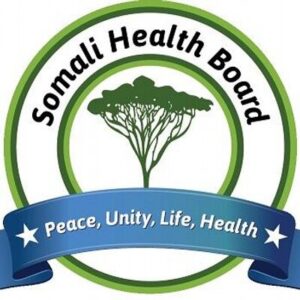Grantee: Somali Health Board
Timeframe: July 2021 – June 2024 | Total Amount: $427,141.94
Year 1: July 2021 – June 2022. Amount: $127,141.94
Year 2: July 2022 – June 2023. Amount: $140,000
Year 3: July 2023 – June 2024. Amount: $160,000
This project will address high rates of untreated or undiagnosed mental illness for Somalis in south King County, resulting from barriers to accessing resources and care. Somali Health Board (SHB) will use funds to deliver culturally-responsive mental health services.
With grant funds, Somali Health Board (SHB) will strategically expand the mental health supports for Somalis in King County. COVID-19 has exacerbated issues of equity in access to health information, care, and decision-making for our entire Somali community. Yet, it is known there are a few specific groups within the community who need additional support due to the complexities and new obstacles to health equity that the pandemic has caused. One of those groups is Somalis experiencing mental health challenges or untreated or undiagnosed symptoms of mental illness.
The community of Somalis in south King County does not have anywhere to turn when they face mental health challenges. Many have experienced trauma that make it difficult to trust government institutions and public health resources to keep their families healthy. Many doctors and care providers in the U.S. operate under outdated, and sometimes blatantly racist, practices that discriminate against or do not effectively reach our community with the type of care they need. Currently no other programs exist in south King County that can address these needs with services that are both evidence-informed and specifically tailored and accessible to Somali’s mental health concerns. Without anywhere to turn, many members of our community end up calling 911 when mental health challenges escalate to crises.
SHB will provide preventative and intervention services before families reach the point of calling 911. SHB will launch a new Somali Mental Health Case Management program.
SHB will ensure that this program reduces or eliminates barriers to successful engagement for Somalis. Specifically, it will address:
- Outreach – To conduct outreach and referrals, SHB will work closely with the Abubakr Islamic Center in Tukwila and the Al-Huda Masjid Mosque in Kent. SHB will identify a representative from these partners to work closely with the SHB mental health team.
- Location – SHB will offer services at or near rural locations where large amounts of Somalis reside, so they are easy to get to.
- Language – SHB will offer services in Somali or in English with translation, so participants understand the information communicated.
- Culture – The SHB will leverage its strengths as a Somali-led organization to ensure this is a culturally- and linguistically-responsive program that meets the needs of the target community. SHB understands the cultural, religious, and social norms in Somali immigrant communities and will leverage these strengths as they design this program. This program will emphasize and acknowledge the cultural traditions of trust, relationship-building, and intergenerational respect. It will also embrace the storytelling tradition and approach health from a casual, non-academic perspective that is more accessible to the community. SHB will reduce the perceived barrier between patients and doctors by providing information in group settings that encourage discussion and questions.
About Our Grantee
Somali Health Board
The Somali Health Board is a coalition of King County Somali health leaders and health systems representatives working in collaboration to improve health outcomes of Somali residents. They believe everyone in King County, regardless of their race, color or creed deserves to have a healthy and high quality of life. The work to improve health outcomes in King County Somali communities through: meaningful partnership development, mutual education of providers and community leaders, and advocating for culturally appropriate and relevant policies and services.
